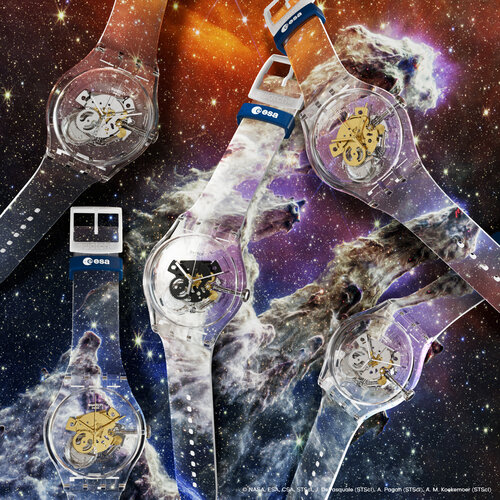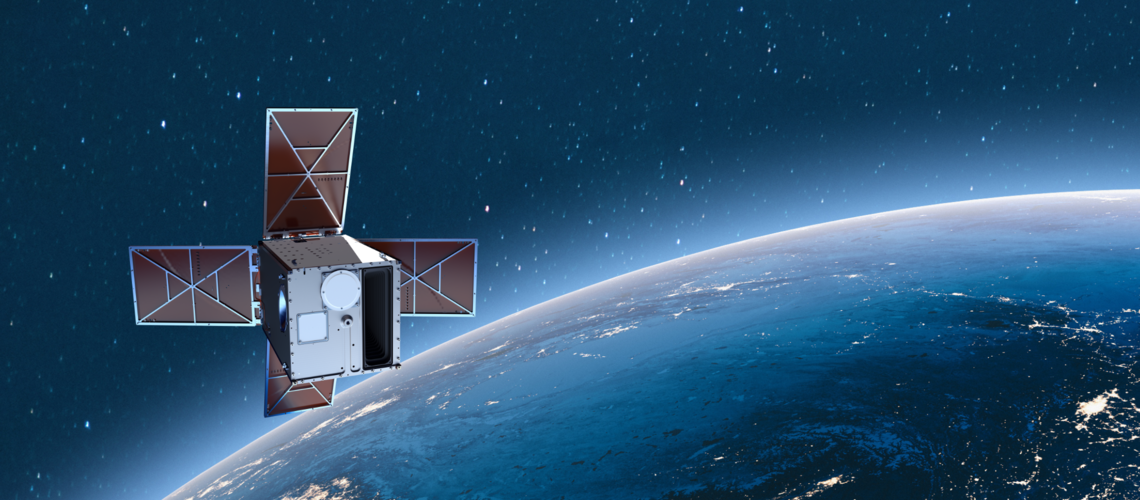
Copernical Team
ESA and Swatch: a stellar partnership

A new collaboration between ESA and Swiss watchmaker Swatch allows space fans to design their own space-themed watch using stunning images from space telescopes.
Ozone hole goes large again

Measurements from the Copernicus Sentinel-5P satellite show that this year’s ozone hole over Antarctica is one of the biggest on record. The hole, which is what scientists call an ‘ozone depleting area,’ reached a size of 26 million sq km on 16 September 2023. This is roughly three times the size of Brazil.
Big Earth imager to be tested on small Vega CubeSat

A briefcase-sized CubeSat being flown on Europe’s next Vega launcher this week will gather 340 km wide views of Earth’s vegetation growth, employing a spectral imager originally designed for ESA’s decade-in-flight Proba-V.
System combines light and electrons to unlock faster, greener computing
 Computing is at an inflection point. Moore's Law, which predicts that the number of transistors on an electronic chip will double each year, is slowing down due to the physical limits of fitting more transistors on affordable microchips. These increases in computer power are slowing down as the demand grows for high-performance computers that can support increasingly complex artificial intellige
Computing is at an inflection point. Moore's Law, which predicts that the number of transistors on an electronic chip will double each year, is slowing down due to the physical limits of fitting more transistors on affordable microchips. These increases in computer power are slowing down as the demand grows for high-performance computers that can support increasingly complex artificial intellige New qubit circuit enables quantum operations with higher accuracy
 In the future, quantum computers may be able to solve problems that are far too complex for today's most powerful supercomputers. To realize this promise, quantum versions of error correction codes must be able to account for computational errors faster than they occur.
However, today's quantum computers are not yet robust enough to realize such error correction at commercially relevant sc
In the future, quantum computers may be able to solve problems that are far too complex for today's most powerful supercomputers. To realize this promise, quantum versions of error correction codes must be able to account for computational errors faster than they occur.
However, today's quantum computers are not yet robust enough to realize such error correction at commercially relevant sc Scientists figured out what causes Earth's strongest lightning
 Superbolts are more likely to strike the closer a storm cloud's electrical charging zone is to the land or ocean's surface, a new study finds. These conditions are responsible for superbolt "hotspots" above some oceans and tall mountains.
Superbolts make up less than 1% of total lightning, but when they do strike, they pack a powerful punch. While the average lightning strike contains arou
Superbolts are more likely to strike the closer a storm cloud's electrical charging zone is to the land or ocean's surface, a new study finds. These conditions are responsible for superbolt "hotspots" above some oceans and tall mountains.
Superbolts make up less than 1% of total lightning, but when they do strike, they pack a powerful punch. While the average lightning strike contains arou NASA selects Commercial Smallsat Data Acquisition contractors
 NASA has selected seven companies to provide commercial data in support of the agency's Earth science research.
The Commercial Smallsat Data Acquisition Program will acquire Earth observation data and related services from commercial sources for NASA. This fixed-price, indefinite-delivery/indefinite-quantity, multiple-award contract will be effective for a period of five years with an opti
NASA has selected seven companies to provide commercial data in support of the agency's Earth science research.
The Commercial Smallsat Data Acquisition Program will acquire Earth observation data and related services from commercial sources for NASA. This fixed-price, indefinite-delivery/indefinite-quantity, multiple-award contract will be effective for a period of five years with an opti NASA to begin critical testing of updated engines for future Artemis missions
 NASA will begin the critical testing of updated engines for its Space Launch System rocket on Thursday, starting with turning power levels up to 111%, as the space agency prepares for future Artemis missions to the Moon.
The assessments mark the final round of certification testing ahead of production of the RS-25 engines for the SLS rocket, NASA said in a statement. The engines are exp
NASA will begin the critical testing of updated engines for its Space Launch System rocket on Thursday, starting with turning power levels up to 111%, as the space agency prepares for future Artemis missions to the Moon.
The assessments mark the final round of certification testing ahead of production of the RS-25 engines for the SLS rocket, NASA said in a statement. The engines are exp China's next robotic lunar probe open to foreign science payloads
 The Chang'e 8 robotic probe, the third to be placed on the moon during China's next lunar exploration endeavor, is open to foreign science payloads, according to the China National Space Administration.
Wang Qiong, deputy head designer of the Chang'e 8 mission, said on Monday at the ongoing 74th International Astronautical Congress in Baku - capital of Azerbaijan - that there will be 200 k
The Chang'e 8 robotic probe, the third to be placed on the moon during China's next lunar exploration endeavor, is open to foreign science payloads, according to the China National Space Administration.
Wang Qiong, deputy head designer of the Chang'e 8 mission, said on Monday at the ongoing 74th International Astronautical Congress in Baku - capital of Azerbaijan - that there will be 200 k Vega-C Zefiro40 Test: Independent Enquiry
 Following the failure of the Vega-C launch (VV22) in December 2022, an Independent Enquiry Commission drew several conclusions and made recommendations to ensure a reliable return to flight and a robust exploitation. One of the recommendations was to implement a (delta-)qualification of the nozzle with a new Carbon-Carbon throat insert material different from that previously used on the Zefiro40
Following the failure of the Vega-C launch (VV22) in December 2022, an Independent Enquiry Commission drew several conclusions and made recommendations to ensure a reliable return to flight and a robust exploitation. One of the recommendations was to implement a (delta-)qualification of the nozzle with a new Carbon-Carbon throat insert material different from that previously used on the Zefiro40 
